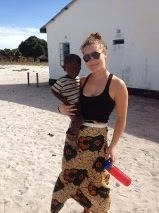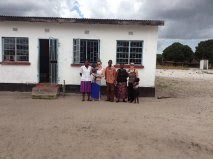We (Caitlin R. & Leah) feel so lucky that we were able to spend the past week at the Nomai Health Clinic as an outreach experience. Geographically speaking, Nomai is only about a 40 minute drive from Mongu. However, the clinic is considered rural as the only access is via 7 km of a sandy/dirt pathway that is wide enough to accommodate a vehicle when necessary (although we only saw one car other than our own throughout the week). The Nomai clinic serves an area that includes about 14 small villages that surround the area and there is no running water, electricity, or even a stethoscope (until we brought one for them last week - thanks donors!) When we arrived on Monday, as our team set up camp, Caitlin & I set to work in the clinic with two of the fabulous volunteers who although not medically trained, have dedicated years of service to the clinic. We helped test for malaria, a required procedure for all those who attend the clinic as there is a high incidence of malaria in the area (we saw a range of 1/4 to 1/2 of presenting patients testing positive for malaria). We also helped out in the assessment, diagnoses, and medication prescription for patients - a challenge for us as we do not diagnose or prescribe medications in Canada, and we were relying on translators for the majority of the assessment. The afternoon was a wonderful way to be introduced to the community as the health care team had organized a health promotion event for International TB Day. They had brought in a local group to drum, sing, and dance to help lure in the village people and then had an informative lesson on TB signs and symptoms, preventative measures, and available treatments. We felt it was a clever and successful way to spread health information, and perhaps a tactic we should use more in Canada. The rest of the week we worked with the nurse who is the only medically educated employee and runs the clinic 7 days a week. We helped assess, diagnose, and prescribe medications to the patients,and although the majority of the visits involved minor treatment we learned a lot about the health care culture in the community. For starters, we found that most patients expected to go home with some sort of medication, the most popular being a week’s worth of aspirin or, more unfortunately, a dose of antibiotics (although we tried to do teaching about antibiotic resistance, and the difference between viruses or bacteria). We faced challenges with this practice as the medication selection consisted of approximately 8 options (until the new shipment arrived mid week), and we had no diagnostic tests or procedures available to guide our clinical decision making. We also had a variety of patients presenting with vague, apparently unrelated symptoms which puzzled us until the nurse informed us that it is common for the villagers (usually younger children) to come in requesting treatment in order to get out of chores at home. Our most acute case was a woman who came in experiencing preterm labour. After assessing and monitoring this woman we soon realized that the woman could not receive appropriate care at the clinic and needed a referral to the nearest hospital. As ambulances only service emergency cases, unfortunately this meant that the woman’s family had to transport her on the clinic’s handmade lifted chair bike to the main road, roughly a 3 hour trek, then find transportation to the hospital from there. This was just one reminder of how the simplest things we take for granted at home are challenges faced daily over here. The highlight of our week was teaching about sexual health to over 150 students consisting of grades 3-9. The community has a high prevalence of teenage pregnancy as well as HIV so we felt it was important to educate the students at a young age. We included teaching of puberty, safe sex, pregnancy, STIs/HIV and respectful relationships; we even had one student volunteer to demonstrate proper condom application at the front of the class. Those who wanted condoms were provided with them at the end of the seminar. We were so thrilled at how involved the students were and the amount of questions we were asked.
Although our clinical experiences were enjoyable, the cultural experience of living in the village was what really made this week unforgettable. The villagers welcomed us into the community and clinic with open arms and we were repeatedly overwhelmed with their generosity and kindness - with gifts of cassava and charcoal, from those who sometimes may not be able to feed their own family. In the evenings, our outreach team members organized a couple campfires and invited the local children to come and sing and dance and we had such a great time listening to their amazing voices. I think we also provided some entertainment for them - they loved our “makua” dance moves. There is something pretty incredible about heading out for a walk only to realize you have a following of about 30 children 5 minutes later. This experience also enabled us to take our friendship to new levels - sharing a one man tent for 5 days and bathing together out of a small basin will do that to people!
Overall it was an amazing, unforgettable experience and we are so thankful to those who made it incredible. Thanks to Save a Life Centre for organizing this week, to Nasilele & Muyunda for being great company, campmates, and translators, & to the wonderful staff & volunteers at Nomai Health Centre for making us feel at home.
Caitlin R. & Leah







No comments:
Post a Comment